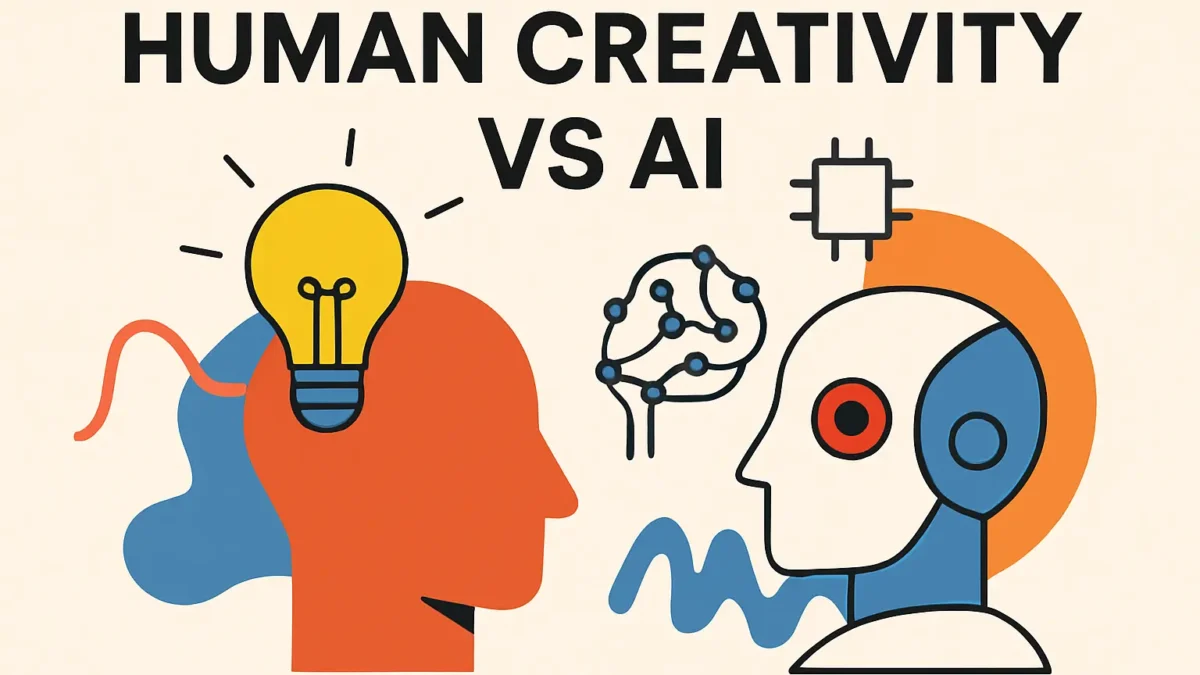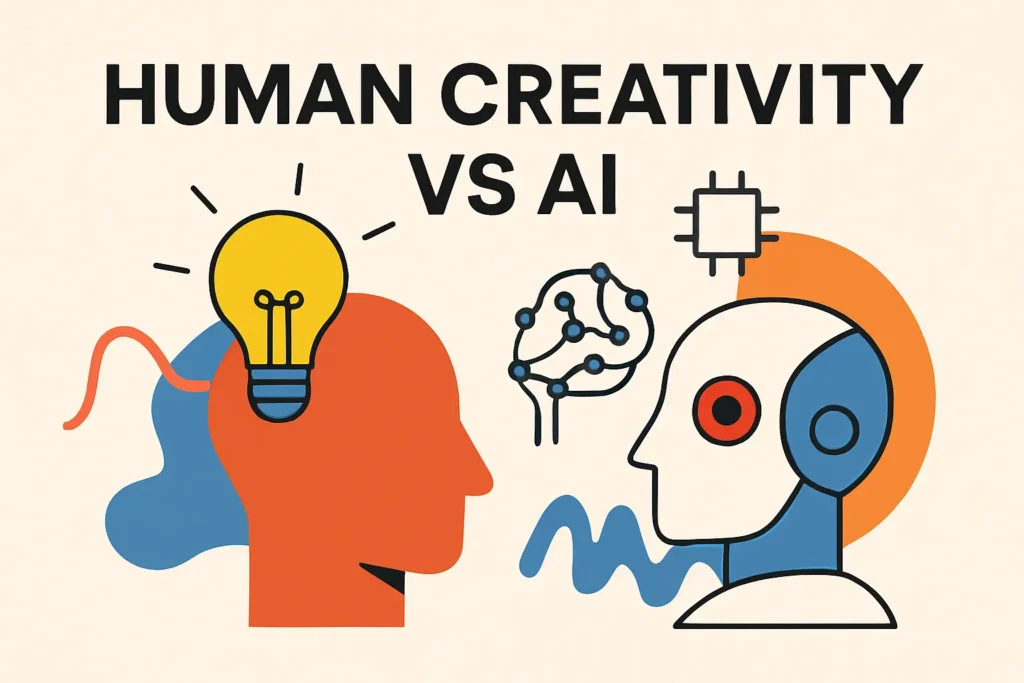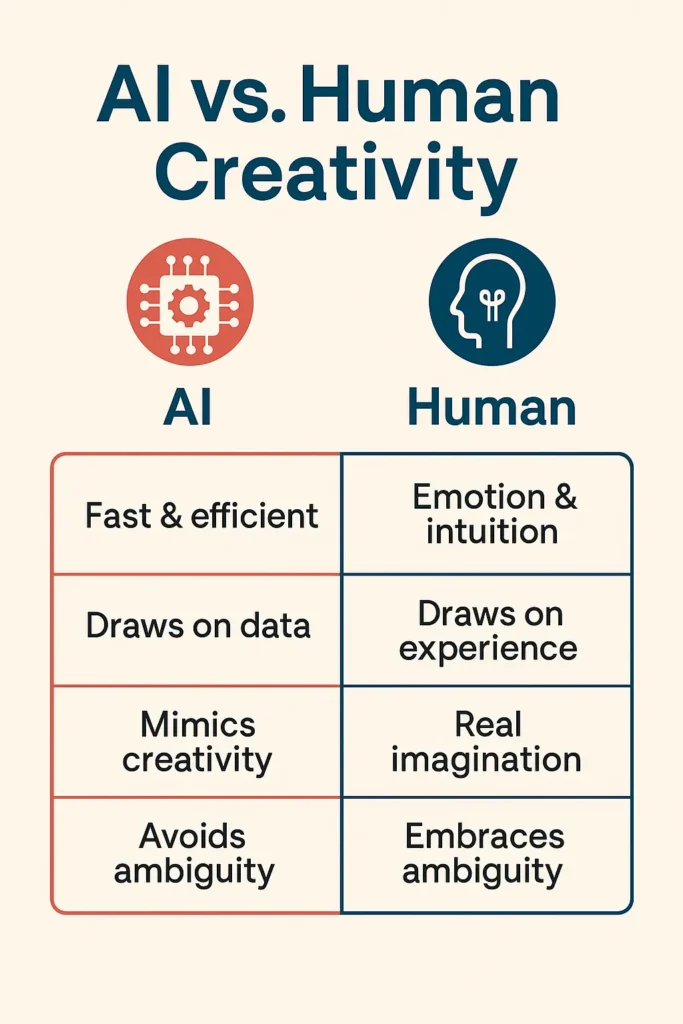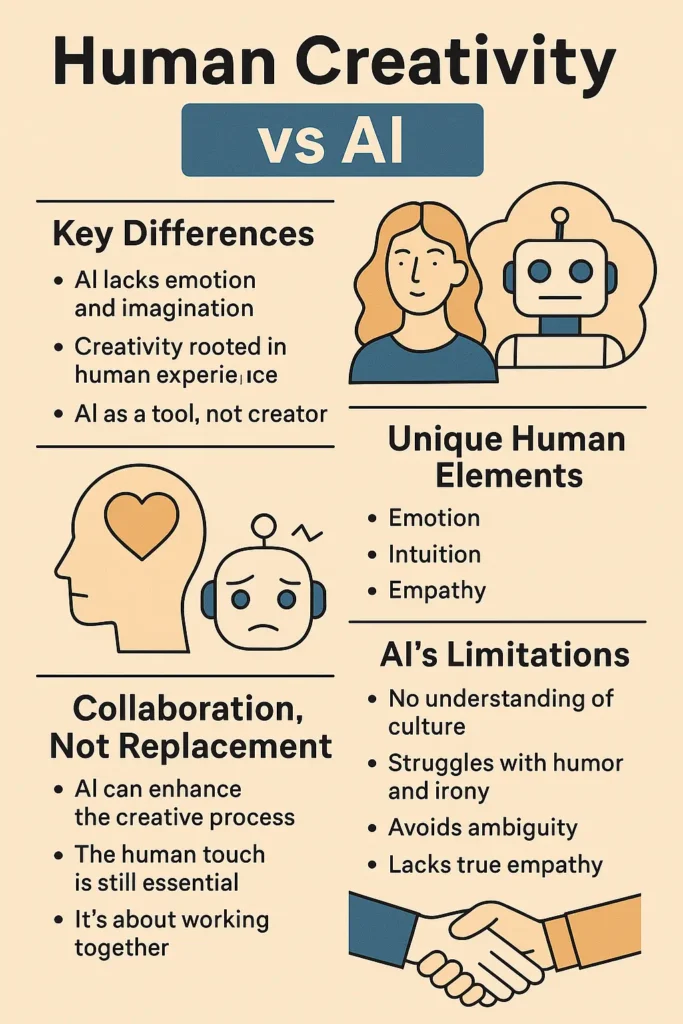
Human Creativity vs AI: 5 Truths You Need to Know

In a world where AI can write essays, generate music, and even design logos, it’s easy to wonder: Is human creativity still necessary? While Artificial Intelligence has become an impressive tool, creativity isn’t just about putting words or images together — it’s about meaning, emotion, and the human experience.
As AI continues to reshape industries, this article explores the enduring power of human creativity, its role in innovation, and why it still can’t be replaced by machines.
Key Highlights:
- AI tools are fast and efficient, but lack emotion, intuition, and real imagination.
- Human creativity draws from lived experiences, cultural depth, and empathy.
- AI may assist creativity, but the soul of creation still lies with humans.
- Across industries, human input brings emotional depth and ethical judgment.
- The future is collaborative — AI supports, but humans inspire.
You can also read our recent articles on Will AI takeover job, creativity with AI, Nvidia AI Powerhouse, DeepSeek’s AI Power, China’s AI shocks the Tech World
The Essence of Human Creativity
Creativity isn’t just about producing something new — it’s about making something meaningful. When a novelist pens a story that moves readers to tears, or a songwriter captures the feeling of heartbreak in a single line, they’re doing something no machine can: tapping into human emotion.
Take J.K. Rowling’s Harry Potter series, for instance. The story was not born from data, but from a flash of imagination during a train ride. It was shaped by her struggles, fears, and love for myth. Similarly, Picasso’s abstract art wasn’t designed by pattern recognition — it was an emotional rebellion against war and conformity.
These creative works connect with us not because they are technically perfect, but because they are authentically human.

AI’s Capabilities — and Its Limitations
AI excels at mimicking creativity. It can generate content, compose symphonies, and paint in Van Gogh’s style. But here’s the catch: AI doesn’t feel. It doesn’t understand the story behind a piece, the cultural nuance, or the heartbreak that inspired it.
Let’s take poetry. An AI can write a haiku with the correct syllable count, but it won’t reflect grief, longing, or nostalgia in the way a human would. AI lacks:
- Empathy: It can’t understand suffering, joy, or love.
- Humor: Sarcasm, irony, and wit often fall flat in AI-generated jokes.
- Ambiguity: Humans embrace contradiction and layered meanings; AI avoids uncertainty.
- Cultural Sensitivity: AI often misfires when handling context-specific traditions or diverse voices.
Human Creativity vs AI: A Cross-Industry Look
Media & Storytelling
Netflix uses AI to recommend shows — but the best shows still come from human writers. Think of The Queen’s Gambit or Everything Everywhere All At Once — stories grounded in personal, often chaotic, human emotion.
Marketing & Advertising
AI can write product descriptions, but human marketers craft emotionally resonant campaigns. Nike’s “Dream Crazy” ad with Colin Kaepernick wasn’t just data-driven — it was bold, risky, and deeply human.
Education & Learning
AI can tutor, but teachers adapt based on emotion and individual student behavior. Human educators read body language, encourage growth mindsets, and build relationships — something AI tutors can’t replicate.
Product & UX Design
AI might design based on trends, but it’s the human designer who understands why a product feels right. Great design, like the original iPod or Tesla interiors, wasn’t born from data — it was born from vision.
Case Study: The Oscars and AI in Filmmaking
In 2025, the Academy of Motion Picture Arts and Sciences made headlines by revising its rules to address AI-generated content in movies. While the Academy allows AI tools to assist in production, it stated that human creative control must be evident to qualify for major categories.
This decision came after rising use of generative AI in screenwriting and editing. But critics and creators alike pushed back, arguing that AI-made scenes lacked emotional rhythm, comedic timing, and narrative subtlety.
The takeaway? Even in a tech-forward industry like Hollywood, the emotional depth and storytelling instincts of human creators remain irreplaceable.
Source: The Verge – Oscars don’t disqualify AI, but human authorship is key
The Invisible X-Factor: Creativity
Here’s a truth AI can’t touch: Imagination is not logical. It is absurd, rebellious, chaotic — and that’s what makes it beautiful.
When Kanye West blended hip-hop with gospel in Jesus Is King, it wasn’t a data-driven decision. When a 5-year-old draws a spaceship that eats dreams, it’s not optimized by algorithms. Imagination breaks rules. It takes creative risks. AI, by design, avoids risk.
Real creativity is not about efficiency. It’s about expression.
Experiment: Human creativity vs AI in Writing
A recent classroom study by a university professor asked students to compare AI-generated poetry to human-written ones. The results?
- AI poems were technically structured — but emotionally flat.
- Human poems were sometimes messy — but left lasting emotional impressions.
- Students overwhelmingly preferred human-written work.
This proves a vital point: People connect with imperfections when they sense real emotion. AI may write well — but humans write with soul.
The Future: Collaboration, Not Replacement

AI is not the enemy of creativity. It’s a tool — a very powerful one. When used wisely, it can enhance the creative process.
Designers can use AI to brainstorm faster. Writers can use it to spark ideas or eliminate writer’s block. But the final voice, the heartbeat of the creation — that should still be human.
The future isn’t about choosing between AI and creativity. It’s about how they can work together to build richer, more thoughtful expressions of the human experience.
Conclusion
The rise of AI is undeniable, but so is the uniqueness of human creativity. AI can assist, speed up, and optimize — but it can’t replace the lived experience, emotion, or imagination of a human mind.
In this age of automation, the most valuable currency may well be what only we can create — stories, emotions, risks, and dreams. Let’s not lose sight of that
Frequently Asked QuestionFAQ
1. Can AI fully replicate human creativity?
No, while AI can generate content based on data patterns, it lacks genuine emotional understanding and personal experiences that fuel human creativity.
2. How can AI support human creativity?
AI can handle repetitive tasks, provide data-driven insights, and assist in brainstorming, allowing humans to focus on strategic and emotional aspects of creation.
3. Are there ethical concerns with AI-generated content?
Yes, issues like authenticity, originality, and potential biases in AI outputs raise ethical questions that need careful consideration.
4. What’s the ideal balance between AI and human input?
A collaborative approach where AI handles data-centric tasks and humans oversee strategic, emotional, and ethical aspects ensures optimal results.
